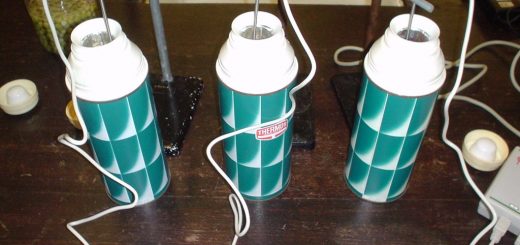Tagged: plant science
measuring plant growth – long experiment
visitors this year: 101 A position sensor can be attached to a plant to record its growth. Depending on the plant chosen this is a very slow process. Using a sensor greatly decreases the...
respiration; germination; fermentation; anaerobic & aerobic
When living things respire they use up oxygen. This can be monitored using an oxygen sensor. The living thing can be a plant, animal or microorganism. Maggots, locusts, or yeast are often used and so can pond-weed. If you use Elodea, its container should be kept in the dark or wrapped in foil.
It is also quite easy to show how temperature affects the rate of respiration
– however, in this example, the oxygen sensor should be able to compensate for its own response to temperature changes.
warm germinating seeds
visitors this year: 126 When seeds germinate they use energy and give off heat. To test this, you can use temperature sensors which will continuously monitor any heat produced. You will set up some...
when do plants grow
visitors this year: 117 It’s not easy to measure how fast a plant grows. You would probably not be too keen to take measurements every few hours – and especially not overnight. There are...
changes in an aquarium
visitors this year: 197 Life in any aquatic habitat has to be supported by oxygen. We are all too familiar with rivers and streams where the oxygen supply has been exhausted and the river...
monitor fermentation in a compost heap
visitors this year: 66 Is mown grass in the compost heap really dead? When you cut the grass you remove its source of vital materials and the cut leaf ‘dies’. But when you feel...
plant transpiration using a pressure sensor
visitors this year: 130 Transpiration and a pressure sensor A sensitive barometric pressure sensor can be used to demonstrate transpiration. The picture here shows a low pressure sensor (as it was called) with a...
scientist 70: the biotechnologist – biosciences for Africa BFA (2014)
visitors this year: 855 A Cambridge project seeks to improve farming practices in Africa by sharing advances in biotechnology. They’re called Biosciences for Farming in Africa (www.b4fa.org). Chris Creese meets one of their founders Dr David...
Podcast: Play in new window
more: Google Podcasts | Spotify | RSS | subscribe options
scientist 39: the plant breeder – Gillian Covey developing wheat at KWS (2013)
visitors this year: 622 You may wonder how today’s farmers are able to grow wheat reliably. We talk with plant scientist Gillian Covey, who explains how different strains of wheat can be bred to make...
Podcast: Play in new window
more: Google Podcasts | Spotify | RSS | subscribe options
scientist 37: the farmer – catchment sensitive farming (2013)
visitors this year: 313 A government initiative to help farmers keep the water supply free of pollutants. We visit a farm in Duxford, England where Andrew Down from ‘Natural England’ explains what is meant by...
Podcast: Play in new window
more: Google Podcasts | Spotify | RSS | subscribe options
scientist 27: the conservation scientist – Andrew Balmford has Wild Hope (2012)
visitors this year: 272 Speaking to The Science show’s Chris Creese, the author of “Wild Hope” explains what ecosystems do for us, and how we can help ourselves by helping the environment. Cambridge conservation scientist, Andrew Balmford,...
Podcast: Play in new window
more: Google Podcasts | Spotify | RSS | subscribe options
scientist 17: the plant scientist – plants coping with drought (2012)
visitors this year: 304 With water shortages and hosepipe bans in summer, Nicola talks to plant scientist Dr Helen Holmes about the importance of water and how plants respond to a lack of it....
Podcast: Play in new window
more: Google Podcasts | Spotify | RSS | subscribe options
scientist 07: the gardener – weeds and herbicides (2012)
visitors this year: 285 As the season switched from spring to summer we look at weedkillers. How do weedkillers (aka herbicides) work? How can a weedkiller target one plant and not another? Roger Frost asked...
Podcast: Play in new window
more: Google Podcasts | Spotify | RSS | subscribe options





















